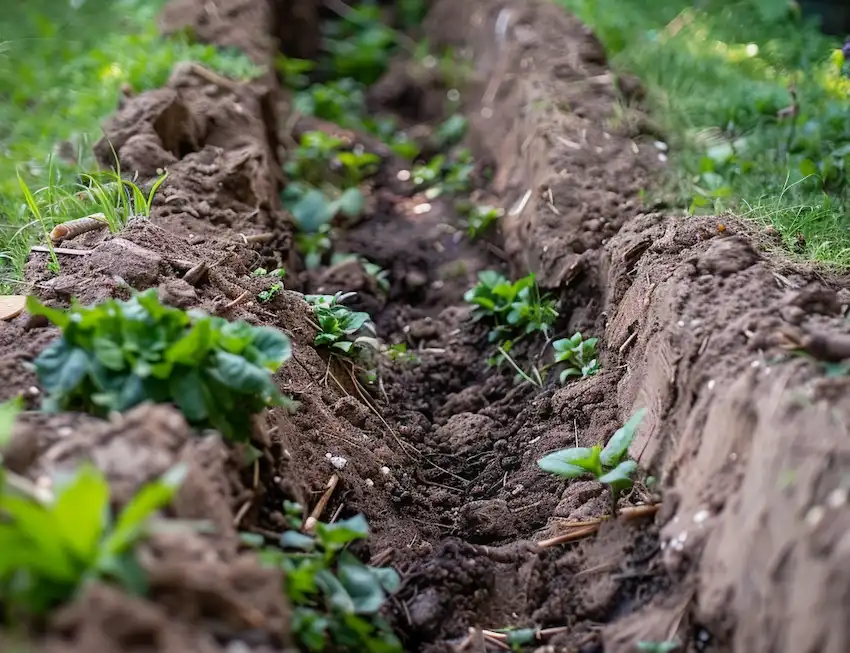Trench Composting: A Comprehensive Guide to Simple and Effective Soil Enrichment
Trench composting is a straightforward and efficient composting technique that offers numerous benefits for gardeners and soil health. This method involves burying organic waste directly in the garden soil, where it decomposes over time, enriching the soil with vital nutrients. Here’s a detailed guide on how to trench compost, why it’s beneficial, and additional tips to maximize the effectiveness of this composting method.
How to Trench Compost
1. **Choose a Location
- Select the Area: Choose a spot in your garden where you plan to grow crops or where the soil needs improvement. Avoid areas with heavy foot traffic or where you plan to dig deeply in the near future.
- Consider Soil Type: Trench composting works well in most soil types but is particularly beneficial in poor or sandy soils that need enrichment.
2. **Prepare the Trench
- Dig the Trench: Use a garden fork or shovel to dig a trench about 6-12 inches deep and 12-24 inches wide. The length of the trench can vary depending on the amount of organic waste you have and the size of your garden.
- Loosen the Soil: Loosen the soil at the bottom of the trench to aid in the decomposition process and improve soil aeration.
3. **Add Organic Materials
- Layering: Start by adding a layer of coarse materials such as straw or small branches at the bottom of the trench. This layer helps with drainage and aeration.
- Add Compostable Waste: Add organic waste such as vegetable scraps, fruit peels, coffee grounds, eggshells, and shredded paper or cardboard. Avoid adding meat, dairy, and oily foods as they can attract pests.
- Balance the Materials: Ensure a good mix of green (nitrogen-rich) and brown (carbon-rich) materials. Green materials include fruit and vegetable scraps, while brown materials include dry leaves and paper.
4. **Cover the Trench
- Cover with Soil: Once you’ve added the organic waste, cover the trench with the excavated soil. Ensure that the soil is spread evenly over the waste to prevent odors and pests.
- Smooth the Surface: Smooth the surface of the soil to make it level with the surrounding garden area.
5. **Maintain the Area
- Watering: Keep the area moist but not waterlogged. Regular watering helps speed up the decomposition process.
- Monitoring: Check the trench periodically to ensure that the organic waste is decomposing properly. You may notice the soil settling or sinking as the materials break down.
Benefits of Trench Composting
1. **Soil Enrichment
- Nutrient-Rich Soil: Decomposed organic waste adds valuable nutrients to the soil, improving its fertility and structure.
- Enhanced Soil Health: Trench composting improves soil aeration and water retention, which benefits plant growth.
2. **Minimal Maintenance
- Low Effort: Trench composting requires minimal maintenance compared to other composting methods. Once the trench is covered, it needs little attention.
- No Need for Compost Bins: There’s no need for a compost bin or turning the compost, making it an easy option for gardeners.
3. **Pest Control
- Reduced Pest Attraction: Burying organic waste in the soil reduces the likelihood of attracting pests such as rodents and flies.
- Odor Reduction: Properly covered trenches minimize odors associated with composting.
4. **Space Efficiency
- Utilize Garden Space: Trench composting makes use of garden space that might otherwise be underutilized. It integrates composting directly into the planting area.
- No Need for Additional Equipment: This method doesn’t require special equipment or containers, making it accessible for all gardeners.
Additional Tips for Effective Trench Composting
- Choose the Right Time: Trench composting is most effective when done in the fall or early spring. This allows the organic materials to decompose over the winter or before planting season.
- Mix in Some Soil: Occasionally mixing some of the surrounding soil into the trench can help with decomposition and nutrient distribution.
- Avoid Overloading: Don’t overload the trench with too much organic waste at once, as it can slow down the decomposition process.
Conclusion
Trench composting is a practical and efficient method for enriching your garden soil while recycling organic waste. By following these steps and tips, you can effectively enhance soil fertility, reduce maintenance, and make the most of your garden space. Embrace trench composting as a simple yet powerful tool to support sustainable gardening practices and cultivate a thriving garden.
